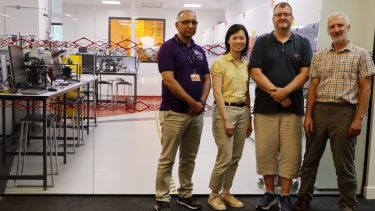- Two engineering departments from the University of Sheffield have collaborated with semiconductor companies (Bay Photonics and Phlux Technology Ltd) to secure funding addressing the UK’s semiconductor skills shortage.
- The grant is provided by Innovate UK, part of UK Research and Innovation, the UK funding agency for research, knowledge exchange and innovation.
- The project, known as ASISST (Addressing Shortages in Semiconductor Skills Training), will see University of Sheffield academics working with industrial partners on improving knowledge of semiconductors amongst the general public, and in particular pre-higher education students, through a range of channels.
In the modern world’s rapidly evolving technology landscape, few sectors are as crucial as the semiconductor industry. From driving our smartphones and computers to enabling advancements in artificial intelligence, autonomous vehicles, and renewable energy, semiconductors have become the backbone of modern innovation. In the UK, there is a pressing challenge: a shortage of skilled professionals to meet the growing demand for semiconductor expertise.
The ASISST project (Addressing Shortages in Semiconductor Skills Training), a new initiative from the Faculty of Engineering at the University of Sheffield and two industrial partners, Bay Photonics and Phlux Technology, will aim to address this knowledge gap. This gap in the UK is caused by both a lack of awareness of semiconductor technology within the general public, as well as an absence of the required dedicated teaching resources and facilities for students.
The ASISST team has secured a £405,840 grant from Innovate UK to address these issues. The project aims to raise public awareness on the importance of semiconductor technology in the UK. The plan includes the creation of free, accessible online courses about semiconductors, and the improvement of current engagement activities to integrate semiconductor experience. There are also plans for the creation of a remote lab for semiconductor device testing aimed at students in year 10 and up, and for new accessible training courses for UK STEM graduates that provide more in-depth knowledge to address the knowledge gap that has come about through lack of resources.
“This project offers a wonderful opportunity for the two engineering departments to work with two highly engaged SMEs to help raise awareness of semiconductor technology and the career options in the UK. The team is excited to be able to turn our plans for accessible contents into reality. We hope to share with the UK public the exciting semiconductor industry and technology in the UK that most people don’t think about and raise the profile of the industry.”
Professor Jo Shien Ng
Department of Electronic and Electrical Engineering
The project will be led by Prof Jo Shien Ng from the University of Sheffield's Department of Electronic and Electrical Engineering (EEE), supported by Dr Gavin Williams (EEE), Dr Ian Farrer (EEE) and Dr Raja Toqeer (Multidisciplinary Engineering Education at the University of Sheffield). The industrial partners, Bay Photonics and Phlux Technology Ltd, are already highly engaged in outreach activities to improve the UK talent pool for the semiconductor industry, and considerably expand the ASISST team’s range of expertise and insights within the semiconductor industry.
The UK's global presence in the semiconductor technology industry faces hindrances due to a shortage of skilled professionals. Every stage of the semiconductor sector, from research and development to innovation, commercialisation, and industrial scaling, relies heavily on specialised technical skills. There is a clear demand for talented individuals to fulfil the industry's requirements.
I am thrilled that Semiconductor Skills funding will enable the EEE and MEE departments at TUoS to raise public awareness about this specialised sector, establish connections with schools and colleges, and address the skills shortages. The Semiconductor Skills project will empower aspiring professionals with practical semiconductor expertise and accessible training, bridging the skills gap and fostering a thriving industry to promote the aim of the national semiconductor strategy.
Dr Raja Toqeer
Multidisciplinary Engineering Education (based in the Diamond, the home of practical engineering education at the University of Sheffield)
As well as the work being done to address the semiconductor skills shortage being essential for the UK’s progress and socioeconomic growth, there are countless benefits for equipping UK students with the skills they need for a career in semiconductors. By raising awareness of the technology at an earlier age and amongst teachers and parents/guardians, there will be new opportunities provided for well-paid jobs, entrepreneurship, and groundbreaking research.



